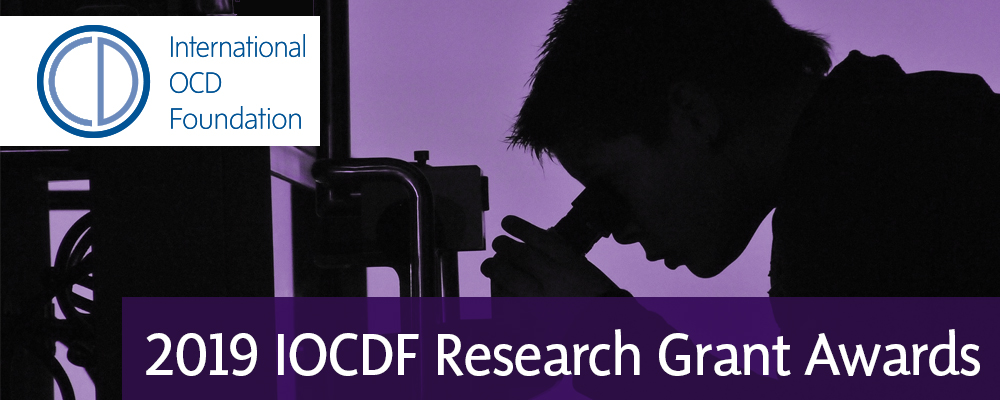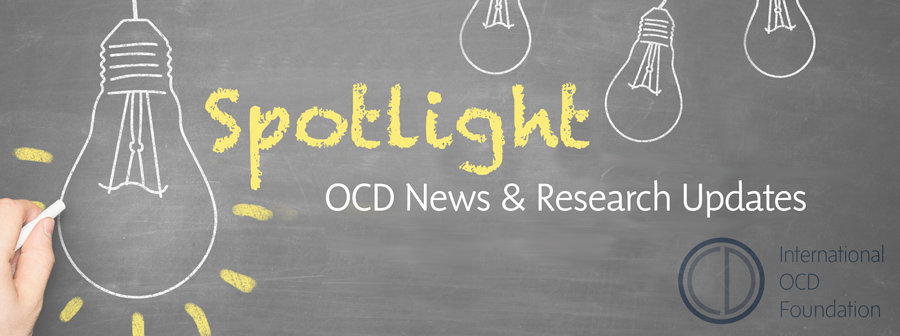Spotlight is our monthly email series that gives our readers regular updates on OCD and related disorders research and news. Enjoy reading the August edition here on our blog, and if you would like to get the September update in your inbox, please click here!
Making Headlines
A roundup of recent stories from journalists, advocates, and researchers across the web.
US Food and Drug Administration
The FDA has granted clearance for a transcranial magnetic stimulation (TMS) device to be marketed for treating OCD. TMS utilizes magnetic waves to stimulate parts of the brain. It has been used as an experimental, off-label intervention for patients who have not responded to first-line OCD treatments (medication and/or CBT), and has shown promising results in clinical trials. The device, Brainsway’s Deep TMS System, is the first TMS device to be cleared by the FDA for treating OCD.

By Janet Stringer
PsychCentral
A study published earlier this year found an increased prevalence of OCD in men diagnosed with Duchenne muscular dystrophy (DMD). DMD is a hereditary illness that causes the affected person’s muscles to progressively weaken and deteriorate. The average patient is expected to live into their mid to late twenties, although some may live into their thirties and forties with exceptional medical care. The study found that standard OCD treatments improved symptoms in these patients.
By Kristen
IOCDF.org Blog / OCD Stories
In the latest article from the OCD Stories series, a young women with OCD describes her experience, and how obtaining the correct diagnosis and treatment has made an impact on her life. Want to tell us your story? Click here for information on how to submit an article.


We are very excited to announce our 2019 research grant opportunities!
Each year, the IOCDF awards grants to research scientists pursuing projects in the field of OCD and related disorders. This year we will award as many as eight research grants through our Young Investigator, Breakthrough, and Innovator Awards programs. Applications are due in early 2019.
To learn more about these grants, and for information about how to apply, please visit our website.
Research Corner
A monthly roundup of the latest OCD research from scientific journals. Articles that require a journal subscription or purchase to view their full text are denoted with "($)". All linked articles provide a brief, publicly-accessible summary of research and findings.
By Christie L. Burton, Laura S. Park, Elizabeth C. Corfield, Nadine Forget-Dubois, Annie Dupuis, Vanessa M. Sinopoli, Janet Shan, Tara Goodale, S.-M. Shaheen, Jennifer Crosbie, Russell J. Schachar & Paul D. Arnold
While OCD occurs in about 2-3% of the population, many more people have obsessive-compulsive traits. These traits do not cause the same level of distress and impairment that is seen in OCD, but the traits are measurable by researchers and can be classified into familiar categories (e.g., cleaning/contamination, symmetry/checking, and rumination). New research in the journal Translational Psychiatryfinds that specific traits, like symmetry and checking behaviors, can be passed on from parents to children, and that genetics plays a role. The researchers believe that by expanding OCD genetics studies to include the relatively larger group of people with OC traits, they can improve the accuracy of future genetics research.
By Noah Chase Berman, Natalie L.Wilver, and Sabine Wilhelm
Family accommodation behaviors that impact (and may worsen) a child's OCD symptoms have been closely studied. Less is known about how parents' interpretations of a child's intrusive thoughts may affect their child's symptoms. A new study, to be published in theJournal of Behavior Therapy and Experimental Psychiatry, finds that when parents interpret a child's intrusive thoughts as threatening, they are more likely to recommend coping strategies to the child that are unhelpful, and that may actually reinforce the child's underlying obsessive beliefs. The researchers believe this phenomenon could be one way in which obsessive compulsive symptoms are passed on from parents to children. Dr. Sabine Wilhelm, vice-chair of the IOCDF Scientific and Clinical Advisory Board and Grant Review Committee Chair, contributed to this research.
Research Highlight: Body Dysmorphic Disorder
Body dysmorphic disorder (BDD) is a complex disorder where affected individuals experience extreme concern about one or more perceived flaws in their physical appearance. BDD is often under-recognized and under-diagnosed.
By D. Rangaprakash, C. Bohon, K.E. Lawrence, T. Moody, F. Morfini, S.S. Khalsa, M. Strober, and J.D. Feusner
Past brain imaging research has shown that people with BDD process visual information in abnormal ways. When viewing faces or objects, they use the parts of their brains associated with processing visual detail more than is seen in the brains of healthy control subjects. Researchers have found that the same is true in people with Anorexia Nervosa. This new study, published in Frontiers in Psychiatry, takes a deeper look at brain circuitry in Anorexia Nervosa and BDD patients, and finds some key differences, with implications for understanding how these disorders impact emotional regulation. Dr. Jamie Feusner, a member of the IOCDF Scientific and Clinical Advisory Board, contributed to this research. We are excited to see how his early BDD brain imaging research - funded through an IOCDF grant - continues to make an impact.
By Fanny Alexandra Dietel, Martin Möbius, Lena Steinbach, Christina Dusend, Sabine Wilhelm, and Ulrike Buhlmann
A person's interpretation of the world around them —their interactions with other people, what they see and hear, and the events in their lives —can affect their mental and emotional wellbeing, particularly if these interpretations have a negative bias. Some researchers believe that appearance-related interpretation biases may be contribute to BDD. Researchers tested a bias re-training method that utilizes a web-based program. They found that when healthy control subjects used the program, their appearance-related interpretation biases could be changed. The researchers hope to conduct a trial to see if the same program can be used to help BDD patients modify their appearance-related interpretation biases, with the goal of improving their symptoms. This paper was presented at 2018 Annual OCD Conference by Dr. Dietel, and will be published in TheJournal of Behavior Therapy and Experimental Psychiatry later this year,
Find other research-related resources from the IOCDF, including:
- Join a research study as a participant
- Learn about the IOCDF Research Grant Program
- Recruit participants for an IRB-approved research study



Leave a Reply